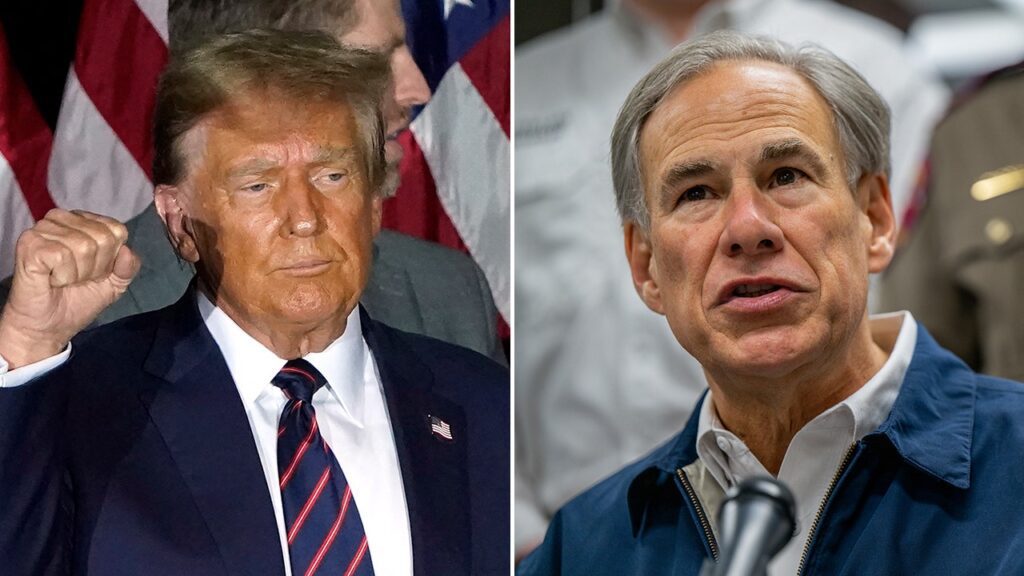The unpredictable dynamism of U.S. politics has once again been underscored as former President Donald Trump threw his weight behind Texas Governor, Greg Abbott, in a simmering feud with the Biden administration over border security. Highly divisive and irrevocably consequential, the clash has its epicenter in the fiercely disputed territorial rights of the Shelby Park area in Eagle Pass, Texas. Trump and Abbott present a united front against what they perceive as a crippling negligence by the Biden administration, urging fellow states to deploy their National Guard to the border and vowing to collaborate in combating the purported “invasion.”
In an unwavering show of support, Trump took to Truth Social on Thursday to decry President Biden’s alleged efforts to constrain the actions of his Republican counterpart, Governor Abbott, thereby enabling an unchecked “invasion.” The former president’s endorsement invigorates an already heated conflict that has been escalating over the past weeks as Texas assumes authoritative control of Eagle Pass’s Shelby Park area, subsequently denying Border Patrol access – an assertive action that has kindled protests and catalyzed threats of retaliatory legal actions from the Biden administration.
Expanding beyond a singular season of political practice, this quarrel has roots trailing back to 2021 when the migrant crisis exacerbated existing tensions between Texas and the Biden administration. The Lone Star State’s response to the crisis was to launch Operation Lone Star, ramping up resources to fortify the border. This action elicited a lawsuit from the presidential administration which asserted that the state was interfering with its jurisdiction over immigration enforcement – a federal responsibility, as defined by the administration.
However, Governor Abbott has met the critique head-on, championing Texas’s “right to self-defense” in apparent resonation with the libertarian ethos. Within this framework, he claims the state of Texas has been invaded, invoking the authority to supersede any contrary federal statutes. His words reverberate with significance amid the contest of wills and differing interpretations of control and enforcement.
Moreover, amidst this discord, the Supreme Court has deemed it just to grant an emergency appeal in favor of the administration, permitting agents to cut the border wire installed by Texas, overturning a lower court’s prohibition. This judicial intervention only serves to deepen the complex cusps of legal interpretation surrounding the dispute.


The tussle over dominion and law enforcement continues to play out in parallel litigation over anti-illegal immigration law, allowing state and local law enforcement to arrest illegal immigrants, and the state’s controversial decision to install buoys in the Rio Grande – both actions again being contested by the Biden administration.


In this sprawling saga of power struggles, former President Trump’s involvement is as significant as it is timely. The promise of “hand in hand” collaboration with Governor Abbott to “Stop the Invasion, Seal the Border, and Rapidly Begin the Largest Domestic Deportation Operation in History,” adds another layer of complexity to the landscape of border politics. More so, as Trump avowed to swiftly effectuate these measures should he ascend to the presidential throne again in January 2025.
If @GregAbbott_TX needs more razor wire, I’ll load it into a pickup myself. pic.twitter.com/pOyo5mXtFp
— Kristi Noem (@KristiNoem) January 25, 2024
As we witness the powerful converging of state, federal, and individual interests in this battle, the critical importance of border policy emerges. Balancing national security, humanitarian responsibility, and constitutional principles remains a formidable challenge. On the one hand, we have Texas and its allies – over two dozen Republican states who have publicly expressed their support for Abbott. On the other, Democrats advocating for the Biden administration to seize control of the National Guard – a stark representation of the ideological chasms that permeate today’s political landscape.
In closing, the unfolding events at the Texas border have reverberations far beyond its immediate geographical confines. The contentious intersection of immigration, national sovereignty, and states’ rights will continue to shape the country’s future. As former President Trump and Governor Abbott resolutely rally against the Biden administration’s policy, the stage is set for an extended and high-stakes tug of war over control, constitutional interpretation, and the direction of America’s immigration policy. The long-developed tension releases, awaiting fundamental decisions that will invariably reshape the course of American history. The hour is critical; the issues at hand are no less than the nation’s future and the preservation of essential democratic values. The eyes of the nation are watching intently. The question of who will prevail and at what cost continues to hang heavily in the air. The resolution of this conflict will undeniably cast a long, defining shadow on the map of American politics.



